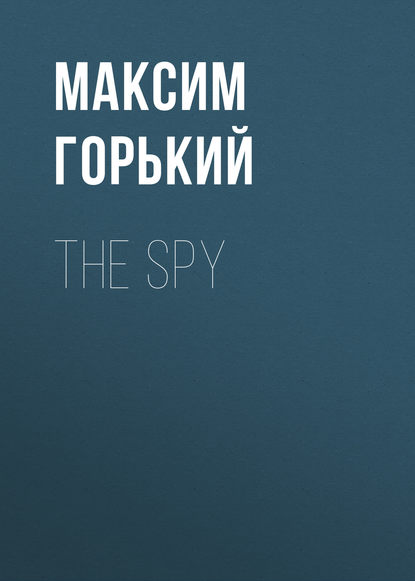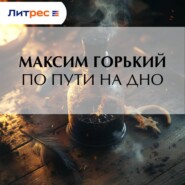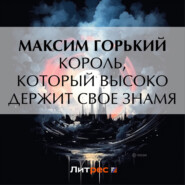По всем вопросам обращайтесь на: info@litportal.ru
(©) 2003-2024.
✖
The Spy
Настройки чтения
Размер шрифта
Высота строк
Поля
"I don't know."
"Pardon me."
Yevsey leaned against the fence, counting Maklakov's tardy steps.
"It's a simple thing – just to follow people," he thought.
The spy came up to him, and said in a satisfied tone:
"We have nothing to do here. To-morrow morning you will put on a different suit, and we'll keep an eye on this house."
They walked down the street. The sound of Maklakov's talk kept knocking at Klimkov's ears like the rumble of a drum.
"Remember the faces, the dress, and the gait of the people that pass this house. There are no two people alike. Each one has something peculiar to himself. You must learn at once to seize upon this peculiar something in a person – in his eyes, in his voice, in the way in which he holds out his hands when he walks, in the manner in which he lifts his hat in greeting. Our work above all demands a good memory."
Yevsey felt that the spy talked with concealed enmity toward him; which aggrieved him.
"You have an exceedingly marked face, especially your eyes. That won't do. You mustn't go about without a mask, without the dress peculiar to a certain occupation. Your figure, you in general, resemble a hawker of dry-goods. So you ought to carry about a box of stuffs, pins, needles, tape, ribbon, and all sorts of trifles. I will see that you get such a box. Then you can go into the kitchens and get acquainted with the servants." Maklakov was silent, removed his beard, fixed his hat, and began to walk more slowly. "Servants are always ready to do something unpleasant for the masters. It's easy to get something out of them, especially the women – cooks, nurses, chambermaids. They like to gossip. However, I'm chilled through," he ended in a different voice. "Let's go to a café."
"I have no money."
"That's all right."
In the café he said to the owner in a stern voice:
"Give me a glass of cognac, a large one, and two beers. Will you have some cognac?"
"No, I don't drink," answered Yevsey, embarrassed.
"That's good."
The spy looked carefully into Klimkov's face, smoothed his mustache, closed his eyes for a minute, and stretched his whole body, so that his bones cracked. When he had drunk the cognac, he remarked in an undertone:
"It's good you are such a taciturn fellow. What do you think about, eh?"
Yevsey dropped his head, and did not answer at once.
"About everything, about myself."
"But what in particular?"
Maklakov's eyes gleamed softly.
"I think perhaps it would be better for me to enter a monastery," Yevsey answered sincerely.
"Why?"
"Just so."
"Do you believe in God?"
After a moment's thought Yevsey said as if excusing himself:
"I do. Only I am not for God, but for myself. What am I to God?"
"Well, let's drink."
Klimkov bravely gulped down a glass of beer. It was cold and bitter, and sent a shiver through his body. He licked his lips with his tongue, and suddenly asked:
"Do they beat you often?"
"Me? Who?" the spy exclaimed amazed and offended.
"Not you, but all the spies in general."
"You must say 'agents,' not 'spies,'" Maklakov corrected him smiling. "They get beaten, yes, they get beaten. I have never been beaten."
He became lost in reflection. His shoulders drooped, and a shadow crept over his white face.
"Ours is a dog's occupation. People look upon us in an ugly enough light." Suddenly his face broke into a smile, and he bent toward Yevsey. "Only once in five years did I see a man – human conduct toward me. It was in Mironov's house. I came to him with gendarmes in the uniform of a sergeant-inspector. I was not well at the time. I had fever, and was scarcely able to stand on my feet. He received us civilly, with a smile. He wore a slightly embarrassed air. Such a large man, with long hands and a mustache like a cat's. He walked with us from room to room, addressed us all with the respectful plural 'you,' and if he came in contact with any of us, he excused himself. We all felt awkward in his presence – the colonel, the procurator, and we small fry. Everybody knew the man; his pictures appeared in the newspapers. They say he's even known abroad. And here we were paying him a night visit! We felt sort of abashed. I noticed him look at me. Then he walked up closer to me, and said, 'You ought to sit down. You look as if you were feeling ill. Sit down.' His words upset me. I sat down, and I thought to myself, 'Go away from me.' And he said, 'Will you take a powder?' All of us were silent. I saw that no one looked at me or him." Maklakov laughed quietly. "He gave me quinine in a capsule, and I chewed it. I began to feel an insufferable bitterness in my mouth and a turmoil in my soul. I felt I would drop if I tried to stand. Here the colonel interfered, and ordered me to be taken to the police office. The search just then happened to end. The procurator excused himself to Mironov, and said, 'I must arrest you.' 'Well, what of it?' he said. 'Arrest me. Everyone does what he can.' He said it so simply with a smile."
Yevsey liked the story. It touched his heart softly, as if embracing it with a caress. The desire awoke in him again to make himself useful to Maklakov.
"He's a good man," he thought.
The spy sighed. He called for another glass of cognac, and sipped it slowly. He seemed suddenly to grow thin, and he dropped his head on the table.
Yevsey wanted to speak, to ask questions. Various words darted about in disorder in his brain, for some reason failing to arrange themselves in intelligible and clear language. Finally, after many efforts, Yevsey found what he wanted to ask.
"He, too, is in the service of our enemies?"
"Who?" asked the spy, scarcely raising his head.
"The writer."
"What enemies? What do you mean?" The spy's face was mocking, and his lips curled in aversion. Yevsey grew confused, and Maklakov without awaiting his answer arose, and tossed a silver coin on the table.
"Charge it up," he said to someone.
He put on his hat, and without a word to Klimkov walked to the door. Yevsey followed on tiptoe, not daring to put on his hat.
"Be at the place at nine o'clock to-morrow. You will be relieved at twelve," said Maklakov in the street. He thrust his hands in his coat pockets, and disappeared.
"He didn't say 'good-by,'" thought Yevsey aggrieved, walking along the deserted street.
When he entered within the circles of light thrown by the street lamps, he slackened his pace, and instinctively hastened over the parts enveloped in obscurity. He felt ill. Darkness surrounded him on all sides. It was cold. The gluey, bitter taste of beer penetrated from his mouth into his chest, and his heart beat unevenly. Languid thoughts stirred in his head like heavy flakes of autumn snow.
"There, I've served a day. How they all are – these different days. If only somebody liked me."
"Pardon me."
Yevsey leaned against the fence, counting Maklakov's tardy steps.
"It's a simple thing – just to follow people," he thought.
The spy came up to him, and said in a satisfied tone:
"We have nothing to do here. To-morrow morning you will put on a different suit, and we'll keep an eye on this house."
They walked down the street. The sound of Maklakov's talk kept knocking at Klimkov's ears like the rumble of a drum.
"Remember the faces, the dress, and the gait of the people that pass this house. There are no two people alike. Each one has something peculiar to himself. You must learn at once to seize upon this peculiar something in a person – in his eyes, in his voice, in the way in which he holds out his hands when he walks, in the manner in which he lifts his hat in greeting. Our work above all demands a good memory."
Yevsey felt that the spy talked with concealed enmity toward him; which aggrieved him.
"You have an exceedingly marked face, especially your eyes. That won't do. You mustn't go about without a mask, without the dress peculiar to a certain occupation. Your figure, you in general, resemble a hawker of dry-goods. So you ought to carry about a box of stuffs, pins, needles, tape, ribbon, and all sorts of trifles. I will see that you get such a box. Then you can go into the kitchens and get acquainted with the servants." Maklakov was silent, removed his beard, fixed his hat, and began to walk more slowly. "Servants are always ready to do something unpleasant for the masters. It's easy to get something out of them, especially the women – cooks, nurses, chambermaids. They like to gossip. However, I'm chilled through," he ended in a different voice. "Let's go to a café."
"I have no money."
"That's all right."
In the café he said to the owner in a stern voice:
"Give me a glass of cognac, a large one, and two beers. Will you have some cognac?"
"No, I don't drink," answered Yevsey, embarrassed.
"That's good."
The spy looked carefully into Klimkov's face, smoothed his mustache, closed his eyes for a minute, and stretched his whole body, so that his bones cracked. When he had drunk the cognac, he remarked in an undertone:
"It's good you are such a taciturn fellow. What do you think about, eh?"
Yevsey dropped his head, and did not answer at once.
"About everything, about myself."
"But what in particular?"
Maklakov's eyes gleamed softly.
"I think perhaps it would be better for me to enter a monastery," Yevsey answered sincerely.
"Why?"
"Just so."
"Do you believe in God?"
After a moment's thought Yevsey said as if excusing himself:
"I do. Only I am not for God, but for myself. What am I to God?"
"Well, let's drink."
Klimkov bravely gulped down a glass of beer. It was cold and bitter, and sent a shiver through his body. He licked his lips with his tongue, and suddenly asked:
"Do they beat you often?"
"Me? Who?" the spy exclaimed amazed and offended.
"Not you, but all the spies in general."
"You must say 'agents,' not 'spies,'" Maklakov corrected him smiling. "They get beaten, yes, they get beaten. I have never been beaten."
He became lost in reflection. His shoulders drooped, and a shadow crept over his white face.
"Ours is a dog's occupation. People look upon us in an ugly enough light." Suddenly his face broke into a smile, and he bent toward Yevsey. "Only once in five years did I see a man – human conduct toward me. It was in Mironov's house. I came to him with gendarmes in the uniform of a sergeant-inspector. I was not well at the time. I had fever, and was scarcely able to stand on my feet. He received us civilly, with a smile. He wore a slightly embarrassed air. Such a large man, with long hands and a mustache like a cat's. He walked with us from room to room, addressed us all with the respectful plural 'you,' and if he came in contact with any of us, he excused himself. We all felt awkward in his presence – the colonel, the procurator, and we small fry. Everybody knew the man; his pictures appeared in the newspapers. They say he's even known abroad. And here we were paying him a night visit! We felt sort of abashed. I noticed him look at me. Then he walked up closer to me, and said, 'You ought to sit down. You look as if you were feeling ill. Sit down.' His words upset me. I sat down, and I thought to myself, 'Go away from me.' And he said, 'Will you take a powder?' All of us were silent. I saw that no one looked at me or him." Maklakov laughed quietly. "He gave me quinine in a capsule, and I chewed it. I began to feel an insufferable bitterness in my mouth and a turmoil in my soul. I felt I would drop if I tried to stand. Here the colonel interfered, and ordered me to be taken to the police office. The search just then happened to end. The procurator excused himself to Mironov, and said, 'I must arrest you.' 'Well, what of it?' he said. 'Arrest me. Everyone does what he can.' He said it so simply with a smile."
Yevsey liked the story. It touched his heart softly, as if embracing it with a caress. The desire awoke in him again to make himself useful to Maklakov.
"He's a good man," he thought.
The spy sighed. He called for another glass of cognac, and sipped it slowly. He seemed suddenly to grow thin, and he dropped his head on the table.
Yevsey wanted to speak, to ask questions. Various words darted about in disorder in his brain, for some reason failing to arrange themselves in intelligible and clear language. Finally, after many efforts, Yevsey found what he wanted to ask.
"He, too, is in the service of our enemies?"
"Who?" asked the spy, scarcely raising his head.
"The writer."
"What enemies? What do you mean?" The spy's face was mocking, and his lips curled in aversion. Yevsey grew confused, and Maklakov without awaiting his answer arose, and tossed a silver coin on the table.
"Charge it up," he said to someone.
He put on his hat, and without a word to Klimkov walked to the door. Yevsey followed on tiptoe, not daring to put on his hat.
"Be at the place at nine o'clock to-morrow. You will be relieved at twelve," said Maklakov in the street. He thrust his hands in his coat pockets, and disappeared.
"He didn't say 'good-by,'" thought Yevsey aggrieved, walking along the deserted street.
When he entered within the circles of light thrown by the street lamps, he slackened his pace, and instinctively hastened over the parts enveloped in obscurity. He felt ill. Darkness surrounded him on all sides. It was cold. The gluey, bitter taste of beer penetrated from his mouth into his chest, and his heart beat unevenly. Languid thoughts stirred in his head like heavy flakes of autumn snow.
"There, I've served a day. How they all are – these different days. If only somebody liked me."

















